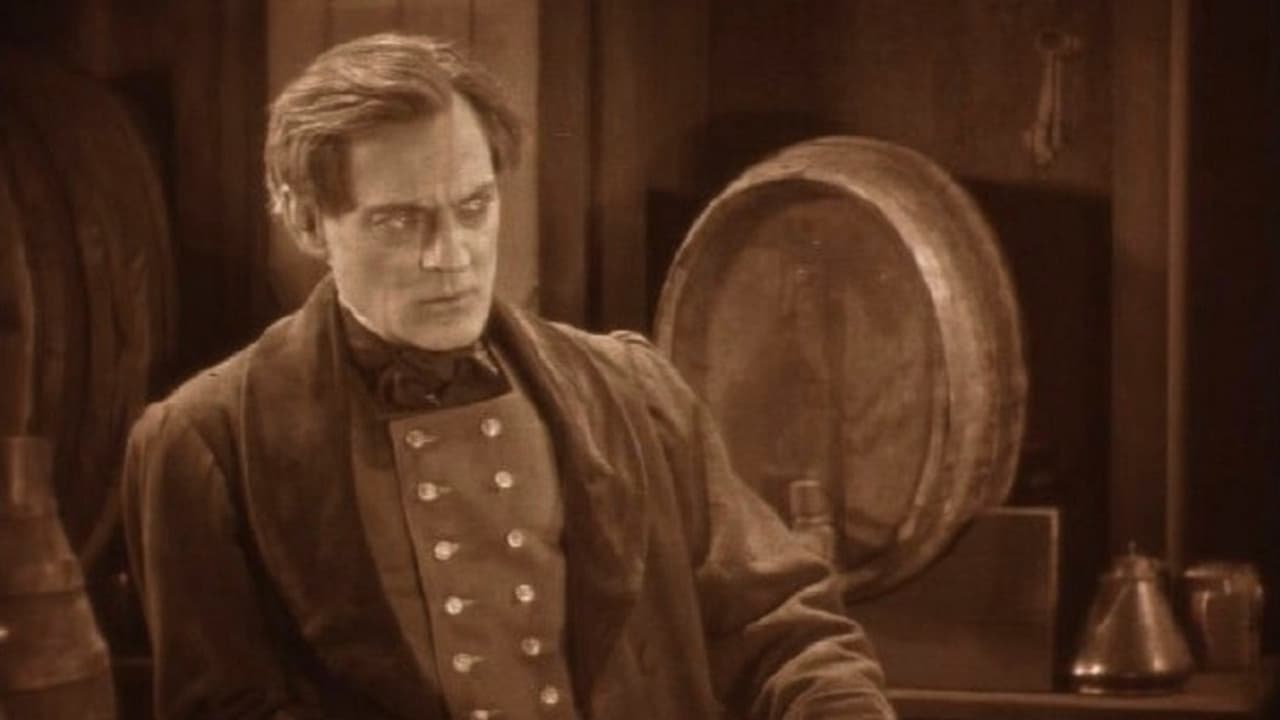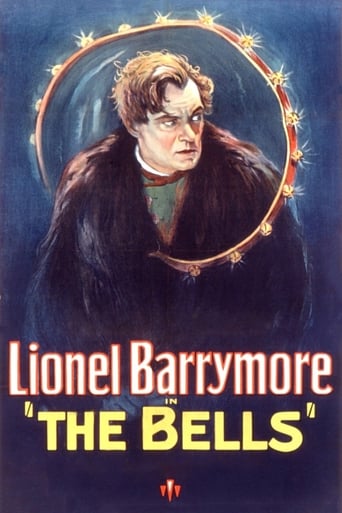

THE BELLS (Chadwick Studios, 1926), Adapted and Directed by James Young, is not credited as a story taken from an Edgar Allan Poe poem but from a play "The Polish Jew" by Erckmann-Chatrain. Starring Lionel Barrymore, THE BELLS is most notable for an early silent film appearance of Boris Karloff, years before his great popularity in the horror genre. Interestingly, his performance here might have set the pattern to his future film roles of that time, but it would be years before achieving his triumph starting playing the Monster in FRANKENSTEIN (Universal, 1931).Opening title: "The scene of 'The Bells' is laid in Alsatia, in a Hamlet at the foot of Mount Snowtop, during the great snow storm of Christmas 1868. Several versions of that classic of the theater has been presented during the last half century, the most notable performance of the play was that of the late Sir Henry Irving." Mathias (Lionel Barrymore) is the owner of the inn and village mill. His ambition is to be a burgomaster. Mathias has a wife, Catherine (Caroline Francis Cooke) and a beautiful young daughter, Annette (Lola Todd). Because Mathias has a habit of giving credit to his friends and patrons is the reason why he hasn't any money. He is in debt with Jerome Franz (Gustav Von Seyffertitz), who intends on taking over his inn if he is not paid. Franz is willing to overlook his debt if Mathias offers his daughter for his hand in marriage, but refuses. Annette is in love with Christian (Edward Phillips), an appointed handsome gendarme. During a carnival, Mathias witnesses a Mesmerist (Boris Karloff) raising a young girl into the air, followed by making a man's hat float above his head. The Mesmerist senses Mathias a skeptic and asks to hypnotize him, but declines. Mathias goes to a fortune teller (Laura Lavarnie) instead, who sees something into Mathias' future that she refuses to reveal. During a Christmas party, Baruch Koweski (E. Alyn Warren), a traveling merchant and Polish Jew on his way to Warsaw, stops in from the heavy snowstorm for the night. When Mathias sees he has gold in his money belt, the desperate Mathias follows him outside in the snow to kill him with the ax and steal his gold. Some time later, after Mathias is named Burgomaster, Jethro (E. Alyn Warren), the victim's brother, arrives asking the new Burgomaster to assist him in finding his brother's killer, but Mathias has problems of his own, including those sinister eyes of the Mesmerist watching him fight with his very own conscience having sounds of sleigh bells constantly ringing inside his head. How much more torment will Mathias have to endure?Except for the title, this edition of THE BELLS is a sort of story that could or might have been adapted by Edgar Allan Poe. It has the ingredients of Poe such as the ghost of the murder victim appearing to his killer, and the evil looking Karloff (18 minutes into the start of the movie) to add to the chills. However, this is very much Lionel Barrymore's film as a tortured soul fighting his own conscience. Yet the sinister looking Karloff, in wavy hair, dark glasses, top hat and cloak, nearly steals the show. Another interesting aspect to THE BELLS is seeing the same supporting players of Gustav Von Seyffertitz, Lorimer Johnston and Caroline Francis Cooke all later listed in the cast in minor roles of Boris Karloff's third installment of SON OF FRANKENSTEIN (Universal, 1939). The lesser known actress of Lola Todd in THE BELLS somewhat resembles that of Mary Philbin's character in THE PHANTOM OF THE OPERA (Universal, 1925) starring Lon Chaney, while Edward Phillips assumes his role well as the typical handsome love interest.Though there have been no known television broadcasts of THE BELLS (at least to the best of my knowledge), this very rare silent film indeed has fortunately survived after all these years, especially for being an independent feature film. It has become released on DVD in 1998, accompanied by some Gothic sounding musical score conducted by Eric Belheim and the William Platt Players, that could either please or be dissatisfying to the ears. Either way, no harm done for 69 minutes. Basically a curiosity for Karloff fans, if nothing else. (*** Bells)
... View MoreContrary to the title and to popular belief, this 1926 feature is not based on or inspired by Edgar Allan Poe's poem "The Bells," which, truth be told doesn't offer much literal plot material for a film adaptation. Instead it is based on a stage melodrama very popular in the nineteenth century and the first part of the twentieth. From what we can tell here, despite its fall from popularity, it was so popular because it is damn good as a melodrama -- a disturbing and tense psychological tale of the motives for a murder and the consequences of that same murder.It is most famous now as an early appearance of Boris Karloff in a significant macabre role, but it is really a vehicle for the talents of Lionel Barrymore, who gives as extraordinary performance as Mathias, the innkeeper who wants to be generous with credit despite the wishes of his wife and father-in-law so he can win enough goodwill to become Burgomaster, but who is driven to murder to pay his debt and then tormented with guilt. He gives a very subtle and multidimensional performance as Mathias, constantly (and increasingly) worried, but still charming. He's perfectly underplayed by still expressive early, so it is so much more effective later when he plays up.It's essential that he manages to convey the innkeeper's tortured thoughts about his debt before the murder itself, because no time is devoted to the decision itself, and Barrymore's acting makes it unnecessary.Karloff, in a smaller but important role as the mesmerist who haunts Mathias with his supposed ability to cause criminals to confess. He's very powerful, magnetic, and harrowingly weird. As a mysterious man who may or may not have dangerous powers of the mind, you can't get much more effective.The direction sometimes seems a little plain in a few of the scenes, but this is more than made up for in a good number of symbolic shots (plain objects coming to resemble nooses) and trick scenes that memorably show what is inside Mathias' mind (blood appearing on his hands as he retrieves some of his money, a argument with a spectral appearance of his dead victim).As this is a silent film adaptation of a stage play, however, some of the talkiness inherent in the stage medium and impossible in the silent film medium has to come through some outlet. This leads to some unnecessarily wordy title cards that tend to distract. In addition, much of the acting, apart from that of Barrymore and Karloff, is overplayed to an unnecessary degree that begins to detract. The ending, while goodhearted, is indeed quite rushed, and leaves several plot threads hanging. It would have been much more satisfying if the film had been extended past this point for a little while.This is a flawed but still very memorable film with elements that make it highly compelling, and one that will hold up very well for most viewers.
... View More"The Bells" is a very fine silent movie from 1926 that is not at all creaky and should manage to impress modern-day viewers. As revealed in my beloved "Psychotronic Video Guide," this story was, remarkably, filmed no less than four times prior to this 1926 version, and three times subsequently in 1930s Europe! It made a huge star of British actor Henry Irving in 1872, when performed on stage. Anyway, the plot is a simple one, and concerns family man Mathias (here played by the great Lionel Barrymore, looking younger than you've probably ever seen him), who, in order to pay off his mortgage debt, kills a wealthy Polish Jew merchant for the gold in his money belt. He soon goes insane with guilt, and begins to hallucinate the ghost of the Polish Jew, hear the bells of his victim's sleigh, dream of himself on trial in court and, in one impressive scene, play cards with the murdered man. It is an excellent performance from Barrymore. The FX in this film are pretty fine, too, and director James Young makes the film visually striking by filling his frame with great detail and constant movement. And Boris Karloff, six years before his Frankenstein breakthrough, is memorable in his small role as a freaky-looking mesmerist. To add to the viewer's pleasure (at least on the disc that I just watched), the fine folks at Image Entertainment have given us a very crisp- and clean-looking DVD, with beautiful color tinting. (I'm still not sure why I despise colorization for old talkies but don't seem to mind it for silents!) Two problems, though: The film ends kind of abruptly, and although the picture is widely quoted as being 92 minutes long, the film I saw last night was just a shade over 70 minutes in length. What's up with that?
... View MoreFits more properly into the category of gothic melodrama than of horror, but lately it has been distributed as horror (perhaps owing to the presence in the supporting cast of the great horror actor Boris Karloff, and to the film's gothic style). It claims to be from an Edgar Allen Poe story, but this concoction of suspicious wives and somnambulists is really little more than a rip-off of Germany's "Cabinet of Dr. Caligari" (which was perhaps itself a take-off on the venerable, much-abused Poe). Barrymore serves admirably as the film's central character, though he hasn't really learned good film technique yet, making his performance one in the "high theatrical" mode.
... View More